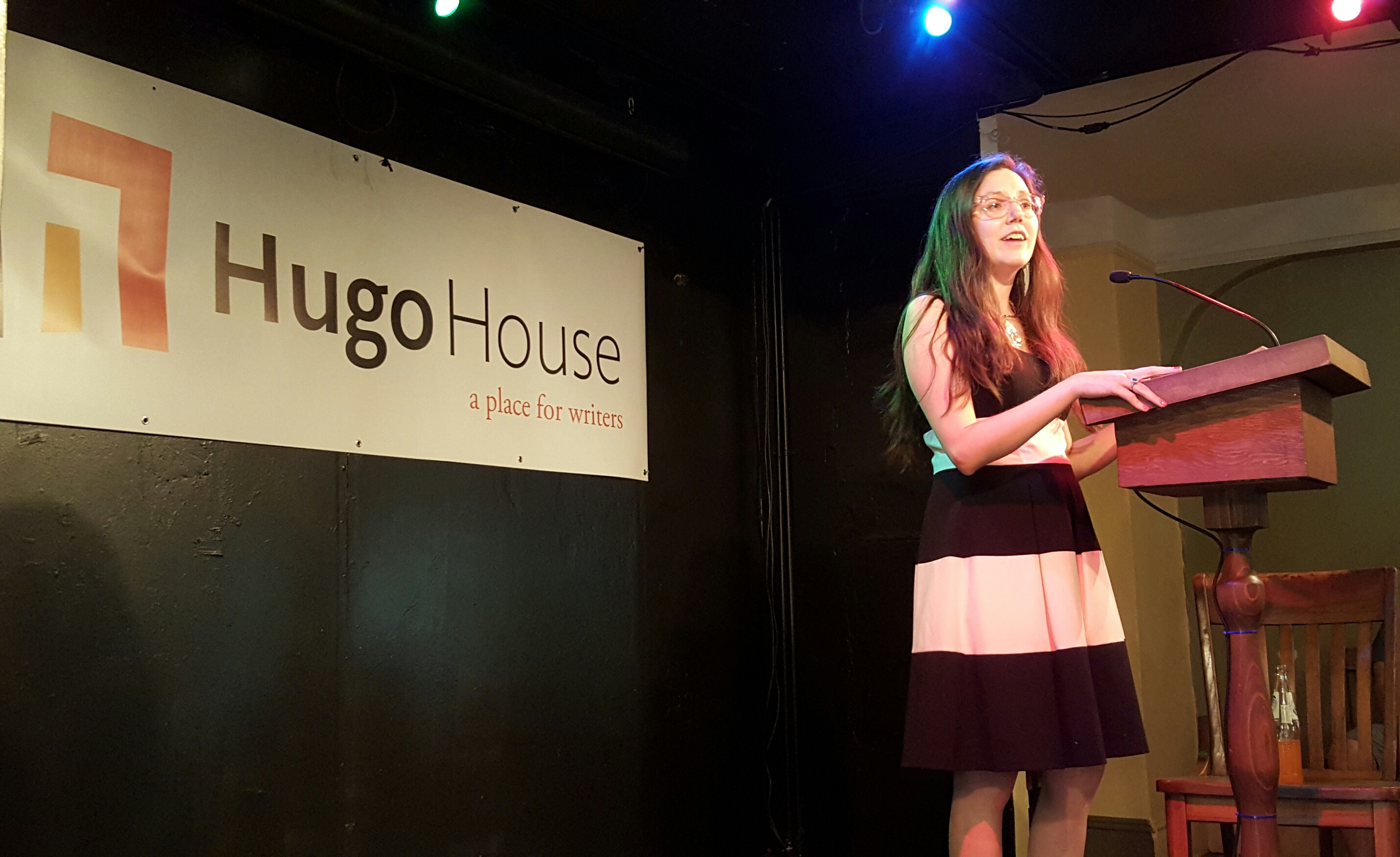The perpetual naked lunch of Starvation Mode

“My eating has been disordered for as long as I can remember,” Elissa Washuta said last night by way of introduction at the launch party for her second memoir, Starvation Mode. The Hugo House was sweltering, but the audience focused on every single word with a surprising acuity. It’s usually hard to get audiences at July readings to focus on anything more than a dirty joke, but Washuta speaks with such intensity that even the sweatiest, most overdressed person in the room — hi there — couldn’t allow his attention to drift if he wanted to.
Starvation Mode is a 12,000-word book from local author Matthew Simmons’ new e-book publishing imprint, Instant Future. It’s formatted like a rule book — echoes of Washuta’s first memoir, My Body Is a Book of Rules — but it chronologically maps Washuta’s difficult relationship with food and her ongoing struggles with body dysmorphia. Each passage begins with a different rule (“Rule 1: Don’t eat the cat,” say, or “Rule 16: Eat what makes you forget”) that touches on a different aspect of her disordered eating, like childhood pickiness, or celiac disease, or dangerous crash diets.
“Are we bad friends? Should people avoid being in relationships with people like us?”
Taxidermied as they are into specific categories, Washuta’s very particular experiences unexpectedly take on a universal quality. While we may not all suffer from eating disorders, can anyone really claim to have an “ordered” relationship with food? And when you get right down to it, aren’t all the rituals and assumptions we place on every single meal, well, impossibly bizarre? Washuta’s meticulous observations make the act of eating feel like something alien, this shoving food into our mouths and just, you know, masticating it into sludge before sphinctering it down our gullets. Which is not to say that Washuta is anti-food; on the contrary, for the launch party she set up a buffet of foods discussed in the book for her audience to enjoy. Two long tables groaning with Pop Rocks and Coke and prepackaged cookies and carrot cake and chocolate cream pie awaited the audience at the end of the night.
After the reading, Washuta was joined by Simmons for an onstage interview. Simmons found an interesting new way to ask the time-tested question everyone asks of memoirists and fiction writers (like Simmons) who incorporate real-life relationships into their work: “Are we bad friends? Should people avoid being in relationships with people like us?” Washuta’s answer was measured and convincing. Even to non-writers, she explained, “when people behave badly in our lives and then retreat, they kind of become characters, anyway.” We’re all writing narratives in our heads. Maybe the people who publish those narratives are just more honest than everyone else?
The audience questions veered toward the technical side of publishing. It’s a delightful truth that even in 2015, some people are still mystified by the idea of buying an e-book. Washuta and Simmons offered a brief, clumsy tutorial on how to read an e-book on your phone. Simmons told a questioner that they could buy the book at Instant Future’s website or on Amazon.com, but he made sure to point out that Washuta “gets more money if you buy the book from Instant Future directly.” Simmons was also forthcoming about Instant Future’s royalty framework: authors and the publisher split the profits right down the middle, a much more favorable deal than traditional publishers. Washuta seemed pleased with the way Starvation Mode turned out. She told the audience that she enjoyed crafting a narrative that would fit inside Instant Future’s suggested 10,000- to 15,000-word range. “It still feels like I have the full world of a book in there,” she said. Then, it was time to eat.
After the reading, I stopped by a grocery store. I walked around, eyeing the produce wrapped in clear plastic and the jugs of kimchi and the subtly orgiastic violence of the cases of prepackaged meat. There in the fluorescent light, Washuta’s numbered lists echoed around in my head and an indisputable truth crept up behind me and jumped on my back: food is really, profoundly strange. If we didn’t need it to survive, most of us would probably never even touch the stuff.
Paul is a co-founder of The Seattle Review of Books. He has written for The Progressive, Newsweek, Re/Code, the Utne Reader, the Los Angeles Times, the Seattle Times, the New York Observer, and many North American alternative weeklies. Paul has worked in the book business for two decades, starting as a bookseller (originally at Borders Books and Music, then at Boston's grand old Brattle Bookshop and Seattle's own Elliott Bay Book Company) and then becoming a literary critic. Formerly the books editor for the Stranger, Paul is now a fellow at Civic Ventures, a public policy incubator based out of Seattle.
Follow Paul Constant on Twitter: @paulconstant
Other recent reviews
Talk about the weather
-
Interpretative Guide to Western-Northwest Weather Forecasts
March 27, 2018
72 pages
Provided by publisherBuy on IndieBound
The man show
-
The Sexiest Man Alive
October 01, 2018
72 pages
Provided by publisherBuy online
Accidentally honest
-
The Shame of Losing
October 01, 2018
264 pages
Provided by authorBuy on IndieBound